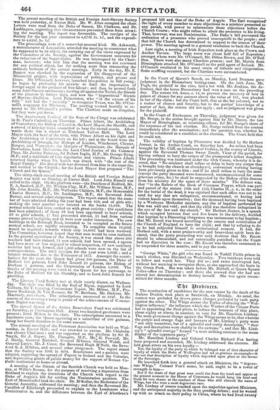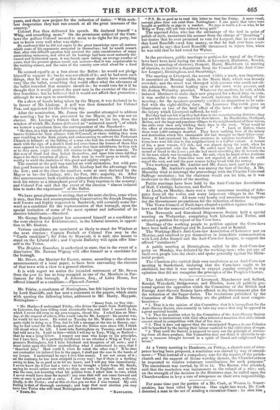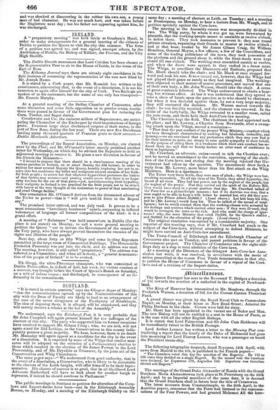The nomination of candidates for the seat vacant by the
death of Sir Rufane Donkin took place at Sandwich, on Monday. As usual, the contest was preluded by divers grave charges preferred by each party against the other. The Whigs accuse the Tories of abusing the " Wel- lington influence," the influence which the Warden of the Cinque Ports• has in appointing the Deal pilots, to induce the boatmen of that place, about eighty or ninety in number, to vote for Mr. Hamilton Lindsay. The most prominent charge against the Whigs seems to be, that whereas the purple and orange flags and banners of Mr. Lindsay's party were " not only numerous, but of a splendid and costly description," " their flags and decorations were shabby in the extreme" ; and that Mr. Lind- say's " splendid cortege " formed " a most striking contrast to the mean display of the opponent party." Mr. Hamilton Lindsay and Colonel Charles Richard Fox having been proposed and seconded, Mr. Lindsay addressed the electors. He laid great stress on his own loyalty— Yes, the loyalty of the party to which he belonged was of that character of loyalty of which the Duke of Wellington had set so glorious an example—it was not that description of loyalty which depended upon place or the favour of the Sovereign. He launched forth into a general attack on Ministers, the " degene- rate Whigs." Colonel Fox's name, he said, ought to be a tower of strength to him—
But if the shade of that great man could rise from the tomb and appear at the present moment in the House of Commons, he would hang his head and blush for very shame at the conduct of those who still claimed the name of Whigs, but who were a most degenerate race. Mr. Lindsay of course touched upon the majorities against klinisters, and the anticipated majority in the then pending debate; and he wound up with an attack on their policy in China, where he had lived twenty years, and their new project for the reduction of duties " With reek- ' Less desperation they had run amuck at all the great interests of the country."
Colonel Fox then delivered his speech. He declared himself " a Whig, and something more." On the prominent subject of the Corn- -laws the gallant Colonel seemed to mean to do right for his party, but not to know very well what was right— He confessed that he did not aspire to the great knowledge upon all matters which some of his opponents arrogated to themselves; but he would remark that, after this difficult question had received the calm consideration of many painstaking statesmen, and after all its bearings had been most maturely dis- cussed and deliberated upon, it was found, upon taking an average number of years, that the present system would not answer—that it was unpalateable to the working-classes, and the voice of the country now cried aloud for a fixed duty.
He seemed equally at a loss about the Ballot : he would not pledge himself to support it ; but he was not afraid of it ; and he had seen such things, that he was of opinion that they must shortly have something -very like the ballot, something that would effect what the advocates of the ballot intended that measure should do : he would vote for it if he thought that it would protect the poor man in the exercise of the elec- tive franchise; but he believed that it would not afford that protection ; although he was open to conviction.
On a show of hands being taken by the Mayor, it was declared to be in favour of Mr. Lindsay. A poll was then demanded for Colonel Fox, and appointed for the following day.
After the nomination, Mr. James the novelist attempted to address the meeting ; but he was prevented by the Mayor, as he was not an elector. Mr. Lindsay's friends then adjourned to his inn, from the window of which Mr. James delivered an "animated speech "; of which we borrow a specimen from the correspondent of the Standard- " He then, in a high strain of eloquence and indignation, condemned the Mel- bourne Cabinet for their alliance with O'Connell, at whose bidding they were now truckling to the Irish priests, and endeavouring to subvert the Protestant Church in Ireland: at the bidding of a man who had the murderous daring to mark with the sign of a death's head and cross-bones the houses of those who were opposed to his machinations, in order that their inhabitants, be they rich or be they poor, might readily fall victims to the dagger of the assassin. To this man of blood had they linked themselves, and upon him alone did they depend for their retention of place. Such men he would spurn as totally un- worthy to wield the destinies of this great and mighty empire."
The contest at the poll was carried on with animation, but with per- fect good humour on both sides. Mr. Lindsay had the advantage from the first ; and at the close the numbers were at once declared by the Mayor to be—for Lindsay, 406 ; for Fox, 360 ; majority, 46. After this announcement, both candidates addressed the electors. Mr. Lindsay took his return as a triumphant proof of a Tory reaction in the country; and Colonel Fox said that the event of the election " almost induced him to make the experiment" of the Ballot.
We have great pleasure in stating, that at the next election, come when it may, that firm and uncompromising Conservative Sir Joseph Douglas, well known and highly respected in Sandwich, will certainly come for- ward as a candidate for the representation of that borough, upon the special invitation of some of the most opulent and influential of its elective inhabitants.—Standard.
Mr. George Rennie junior has announced himself as a candidate at the next election for Kidderminster, in the Liberal interest, in opposi- tion to Mr. Godson.
Various candidates are mentioned as likely to stand for Windsor at the next election : Captain Pechell or Colonel Fox may be the " Castle candidate"; Sir John de Beauvoir, it is said, also means to stand on the Liberal side ; and Captain Bulkeley will again offer him- self to the Tories.
The Brighton Guardian is authorized to state, that in the event of a dissolution Mr. Newton Wigney will offer himself as a candidate for the borough.
Mr. Divett, the Member for Exeter, seems, according to the obscure announcement of a local paper, to have been canvassing the electors of that town with a view to a general election.
It is with regret we notice the intended retirement of Mr. Bewes from the post he has so long occupied as one of the Members in Par- liament for this borough. J. Johnson, Esq., of Laira House, has offered himself as a candidate.—Plymouth Journal.
Mr. Frisby, a coachman of Nottingham, has felt injured in his virtue by Lord Rancliffe, and has sent a statement to the papers, which starts with quoting the following letter, addressed to Mr. Hardy, Maypole, Nottingham- " Bunny Park, 1st May 1841. " Mr. Hardy—I understand Frisby, who drives the coach from Nottingham to Leicester, has been telling most abominable lies, and that I wanted to do, which 1 never did even to my own tenants, thumb him. I asked him on Mon- day, at the request of others, if he would vote for Mr. Larpent : his answer was, he would let me know. He voted on Tuesday for Mr. Walter ; which he was quite right in doing as a Tory, but he left a message at the inn at Bunny, say- ing he had voted for Mr. Larpent, and that the Tories were above 100, I think 130 ahead when he left. I went into Nottingham on Tuesday, and found he had told me a lie. I said to him—which I will say to Tory, Whig, or Radical— that he was a lying fellow. I respect any man who keeps to his principles, bat I hate liars. It is perfectly indifferent to me whether a Whig or Tory re- presents Nottingham, but 1 hate falsehood and deception of all sorts ; and I must insist upon this fellow contradicting. what I understand he says, that 1 thumbed him.' How could I, when he voted the other way ? If he does not contradict his infernal lies in the paper, I shall put the case in the hands of lily lawyer. I understand he says I owe him money. I am not aware of it ; on the contrary, he has been overpaid in every way but if there is a farthing owing to him, be so good as to let me know, and I will pay him immediately. I never knew the fellow had a vote; but he brought a letter from Mr. Sands, saying he would rather vote with me than any man in England; and as that was the case, not knowing what his politics were, I asked him to vote, which I never would have done for myself: any man that will not come forward and vote at once is not worth a curse. I ever behaved, as you know, well—ay, kindly, to the Tories; and at this election you see how I was treated. My own feeling is that of thorough contempt ; and hope that next election you may have two Tories who will treat Nottingham as it deserves.
" Yours, &c. " Remorarrx.
" P.S. Be so good as to read this letter to that liar Frisby. A more venal, corrupt place does not exist than Nottingham : I can prove that votes were bought as publicly as pigs in a market. No man is worth a d—n who, be he Whig or Tory, will not vote without being paid."
The aspersed Jehu, who has the advantage of the lord in point of polish of style, exonerates his accuser from the charge of " thumbing"; but•denies that he ever promised to vote for Larpent, that he ever said that Lord Rancliffe owed him money, or that he had ever been over- paid ; and he says that Lord Rancliffe threatened to injure him, when he was told that be had voted for Walter.
In the provinces, public meetings to petition for repeal of the Corn- laws have been held during the week, at Liverpool, Darlaston, Kendal, Bolton (a meeting of electors), Gosport, Hurst, Blackburn (a meeting of electors, to receive a deputation from the Council of the Anti-Corn- law League), Birmingham, and Stourbridge.
The meeting at Liverpool, the second within a week, was important. It assembled on Monday night, in the Music Hall, which was densely crowded ; and the street was thronged with persons who could not ob- tain admission. Several leading men of the town were present, and Sir Joshua Walmsley presided. Whatever the motives, he said, which induced Ministers to make their new proposal for a fixed duty on corn, it was useful to the cause. The remark indicates the feeling of the meeting ; for the speakers generally testified no disposition to be satis- fied with the eight-shilling duty. Mr. Laurence llayworth gave an illustration or two of the fatal effect of the laws : after speaking of the injury which Liverpool suffered, he said— But they had not felt it as they had done in the manufacturing districts ; they had not felt the absence of demand for their labour. In Manchester, Stockport-, Bolton, and the large and populous villages in the neighbourhood of these towns, the mills were then only working three days in the week. What would be the effect of circumstances like these ? * * Look at Bolton, where there were 1,400 cottages deserted. They knew nothing here of the misery and destitution which this abominable law had brought on their fellow-crea- tures. It had [murdered his fellow-creatures in numbers incalculable. The Corn-laws were felt also in this neighbourhood to a feafful extent. A tenant of his, a poor woman, fell sick, and was almost dying for want, when he became acquainted with the fact. He called upon her, and she had not a morsel of bread in the house; yet she had saved something like 21. towards the 3/. for rent, which was becoming due. He said, when he heard of her destitute condition, that if the Corn-laws were not repealed, at all events he could repeal the rent, and told the poor woman to buy bread with the money.
Two working-men, Mr. Ambler and Mr. Jones, took part in the pro- ceedings. Mr. Ambler's speech was among the best of the day. A Mr. Macarthy tried to interrupt the proceedings with the Chartist Universal Suffrage resolution ; but the chairman would not let him, as it was irrelevant to the objects of the meeting.
Public meetings have been held by the Anti-Corn-law Associations of Hull, Uxbridge, Leicester, and Eccles.
At Leeds, on Monday, there was a very numerous meeting of dele- gates from all the towns and many important villages in the West Riding of Yorkshire. All were very hearty and unanimous in support- ing the Government propositions for the reduction of duties. The Town-Council of Poole have adopted a petition against the Corn- laws and for the removal of restrictions on trade.
The Newcastle and Gateshead Shipowners Society held a special meeting on Wednesday, comprising both Liberals and Tories, and adopted a petition for repeal of the Corn-laws.
Meetings of the working people to petition against the Corn-laws have been held at Hastings and St. Leonard's, and at Kendal.
The Working-Men's Anti-Corn-law Association of Leicester met on. Monday, and resolved to put themselves in immediate communication with Lord John Russell and the Anti-Corn-law League, to support the offered " instalment."
A public meeting at Birmingham, called by the Anti-Corn-law party on Monday, was defeated by the working-men ; who put one of their own people into the chair ; and spoke generally against the Minis- terial project.
The Chartists also carried their own resolutions at an Anti-Corn-law meeting in Sunderland, declaring that the Corn-laws ought to be abolished, but that it was useless to expend popular strength in any agitation that did not recognize the principles of the People's Charter..
The Anti-Slavery Societies of Liverpool, Manchester and Salford, Kendal, Wakefield, Bridgewater, and Hitchin, have all publicly pro- tested against the opposition which the Committee of the British and Foreign Anti-Slavery Society have offered to the Government plan for the reduction of the Sugar-duties. The resolutions published by the Committee of the Hitchin Society are the pithiest and most compre- hensive—
" 1. That it is the opinion of this Committee that it is inexpedient for the Anti-Slavery Society unnecessarily to take any course that may be opposed to a great national benefit.
" 2. That the position taken by the Committee of the Anti-Slavery Society in London is inconsistent with their often reiterated assertion that slave-labour cannot stand in competition with that of free men. " 3. That it does not appear that the emancipated Negroes in our Colonies will be benefited by the having their labour confined to the cultivation of sugar. " 4. That until the Society is prepared to carry out the principle of abstain- ing from all slave-produce, this Committee does not think it advisable to op- pose a measure brought forward in a spirit of liberal and enlightened legis- lation."
At a Vestry meeting in Headcorn, on Friday, a church-rate of nine- pence having been proposed, a resolution was moved by way of amend- ment—" That instead of a compulsory rate for the repairs of the parish- church and the support of divine worship therein, the Churchwardens be requested to receive voluntary contributions for such purposes." The amendment was carried, by 33 to 14. The Rector, who presided, said that the resolution was tantamount to the refusal of a rate ; and, on the strength of the decision in the Braintree case, he called upon the Churchwardens to levy a rate of ninepence on their own responsibility.
For some time past the garden of a Mr. Cook, at Weston in Somer- setshire, has been rifled by thieves. One night last week, Mr. Cook detected a man in the act of stealing a cucumber-frame he shot him ;
and was shocked at discovering in the robber his own son, a young man of bad character. He was not much hurt, and was taken before the Magistrate next day ; but his father not appearing against him, he was discharged.




























 Previous page
Previous page